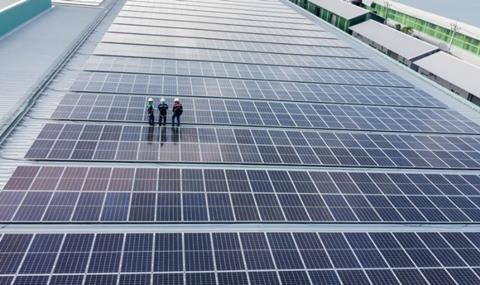
The UK Warehousing Association (UKWA) has welcomed news of a new £55m government fund to support an energy transition for the UK’s industrial sector which comes in the wake of the association’s call for a major roll out of solar panels on warehousing roof tops across the UK.
The Industrial Fuel Switching (IFS) Competition is part of the government’s £1bn Net Zero Innovation Portfolio (NZIP), which aims to help industries switch to lower carbon fuels including electricity, hydrogen, biomass, and other low carbon fuels
UKWA chief executive Clare Bottle said the launch of the fund chimes with UKWA’s recent report - Investment Case for Rooftop Solar Power in Warehousing - which argues that the sector could double the UK’s solar capacity, saving billions of pounds in electricity costs and millions of tonnes of carbon emissions.
Referring to the report Bottle said: “Based on our research findings, we have prepared a policy paper on the potential benefits and barriers to implementing solar PV on warehouse rooftops across the UK, so we are encouraged to see that support for industry to transition to sustainable and more secure energy supplies is clearly on the government’s agenda.”
Turning to the Chancellor’s fiscal statement last week, Bottle welcomed the six-month Energy Bill Relief Scheme (EBRS) designed to protect non-domestic energy users from rising energy bills this winter.
UKWA added it looks forward to future updates on potential further support from government for industry after March 2023.
Other measures, announced as part of the government’s growth plan, include new legislation under the Planning and Infrastructure Bill to accelerate delivery of major infrastructure projects across England.
While this is good news for the sector, Bottle said that UKWA is "still determined” to highlight the need for further planning reform on land use to facilitate the development of “much-needed” additional warehousing space close to population centres".
She added: “It remains to be seen whether the plans for Investment Zones will help unlock additional warehouse development, although the various tax incentives being considered, such as 100% business rates relief and Enhanced Capital Allowance for qualifying companies on plan and machinery assets – would represent major benefits for new and expanding warehouse operators.”
She added that the potential Employer National Insurance Contributions relief being considered for companies within investment zones would be helpful to the industry in combatting labour shortages and low pay and proposed Stamp Duty Land Tax for land and buildings bought for use or development for commercial purposes would support the growth of warehousing, albeit only within the designated zones.
“We understand that the Department for Levelling Up, Housing and Communities, under which responsibility for warehousing falls, will shortly set out more detail on the government’s planning offer. Hopefully, this will include detail on the level of deregulation and the streamlined mechanism for securing planning permission,” Bottle added.
She concluded: “There is much in the government’s Growth Plan that is helpful to our sector, including the extension of the Annual Investment Allowance (AIA), which will support business investment and make tax simpler for any business investing in plant and machinery.
“We have yet to see all the detail around the proposals for Investment Zones – and the devil is always in the detail – but we are particularly pleased to welcome the government’s commitment to energy transition and stand ready to work alongside policy makers and implementors to accelerate the journey towards cost-effective, affordable, sustainable, and secure energy alternatives.”













